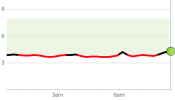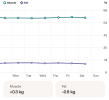Chris24Main
Well-Known Member
- Messages
- 1,024
- Type of diabetes
- I reversed my Type 2
- Treatment type
- Diet only
OK - just putting a marker down that today is a fasting day (or at least the start of one).
For what it's worth; I'm less sure that I need to fast; my blood glucose was rock solid over night - a flat line around 4mmol/L and my fasting ketones are actually higher than I've ever measured. My visceral fat (as measured by my scales) is under the level that I usually set as a limit.
My overall weight is about 0.5kg over ideal, so I'm not worried about fasting losing weight I cannot "afford" - and I still believe in the wider benefit of fasting - but mainly this is an opportunity to run a fast from a "good" starting point while wearing a CGM; and I cannot resist the temptation to do this as a way of gathering evidence in my ongoing experimentation of my own metabolism.
So - all of that for context: I will do some paddling now, and then later I'll have a walk in the evening - the key thing is whether I have any issues with sleeping tonight.
If I do: and the rest of the numbers bear out why I have any issues with sleeping, I will have to conclude that the benefits of a 36 hour fast no longer outweigh the attendant grief - and be happy that this means that this kind of fasting just isn't necessary any more, and that the kind of 18:6 style of skipping breakfast fasting is optimal.
But - I'll be kind of sad if that is the outcome - I mean, I'll repeat this again; fasting is not for everyone - but I have found it to be the most amazingly effective technique for reversing insulin resistance, and as a "mechanism guy" - there really isn't anything that simply makes more sense to me - regularly emptying your glycogen storage just has to be the most effective and quickest way to beat T2DM (if you can do it) without meds.
So - we'll see; I'll report through the 36 hours, but I could not be starting off in a better state..
For what it's worth; I'm less sure that I need to fast; my blood glucose was rock solid over night - a flat line around 4mmol/L and my fasting ketones are actually higher than I've ever measured. My visceral fat (as measured by my scales) is under the level that I usually set as a limit.
My overall weight is about 0.5kg over ideal, so I'm not worried about fasting losing weight I cannot "afford" - and I still believe in the wider benefit of fasting - but mainly this is an opportunity to run a fast from a "good" starting point while wearing a CGM; and I cannot resist the temptation to do this as a way of gathering evidence in my ongoing experimentation of my own metabolism.
So - all of that for context: I will do some paddling now, and then later I'll have a walk in the evening - the key thing is whether I have any issues with sleeping tonight.
If I do: and the rest of the numbers bear out why I have any issues with sleeping, I will have to conclude that the benefits of a 36 hour fast no longer outweigh the attendant grief - and be happy that this means that this kind of fasting just isn't necessary any more, and that the kind of 18:6 style of skipping breakfast fasting is optimal.
But - I'll be kind of sad if that is the outcome - I mean, I'll repeat this again; fasting is not for everyone - but I have found it to be the most amazingly effective technique for reversing insulin resistance, and as a "mechanism guy" - there really isn't anything that simply makes more sense to me - regularly emptying your glycogen storage just has to be the most effective and quickest way to beat T2DM (if you can do it) without meds.
So - we'll see; I'll report through the 36 hours, but I could not be starting off in a better state..





